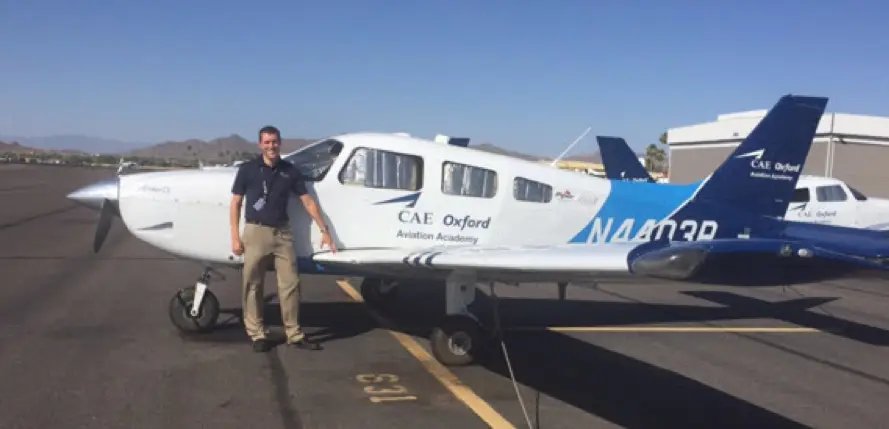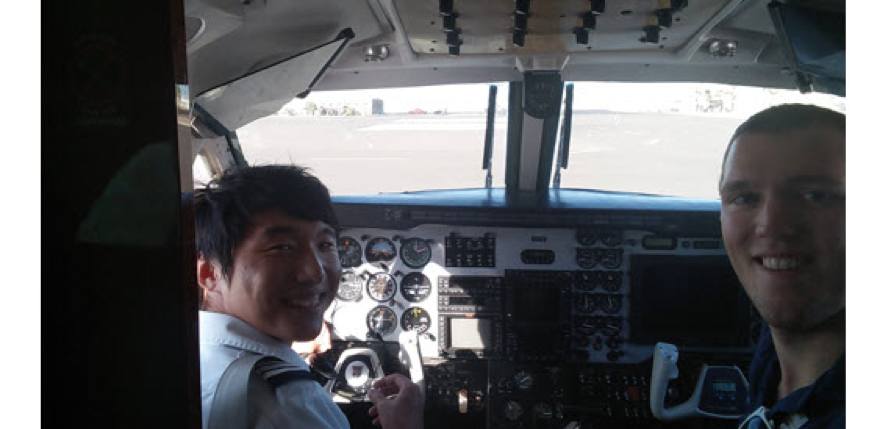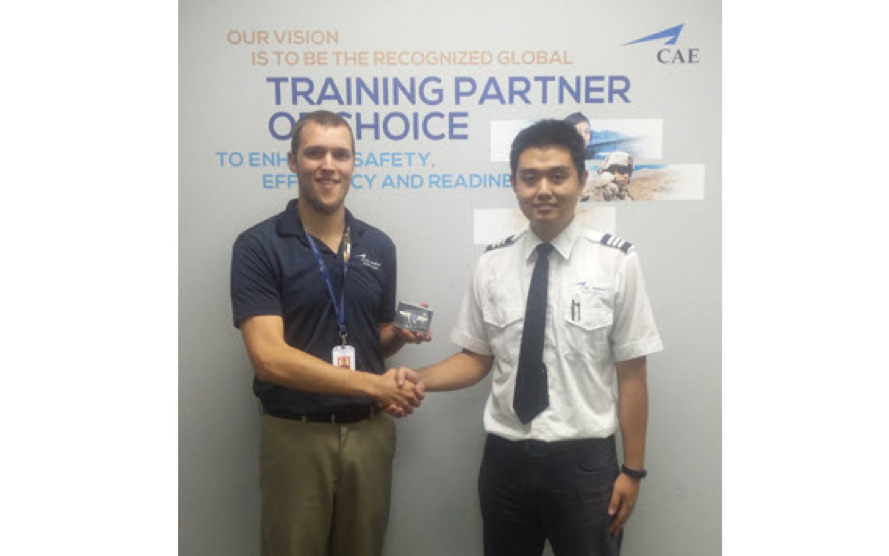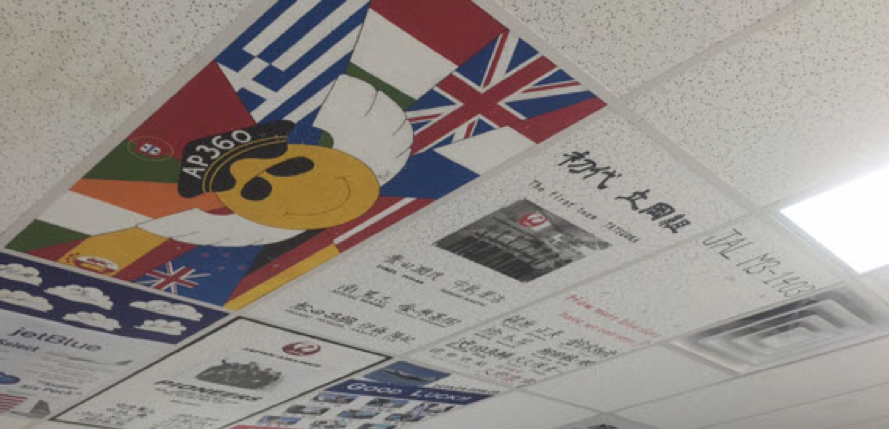


It all starts with a dream… This is the first thing we have learned when we interviewed Seppe Ramaekers, Assistant Chief Flight instructor at CAE Phoenix. Keep reading as he shares his story, his perspective on the pilot career and his passion for instructing cadets.
Seppe, I will ask you THE question pilots frequently get. Why did you want to become a pilot?
It’s true, it is a question we get asked a lot as pilots! And it’s always a bit strange to answer, because it’s not that much of a desire – the passion for flying is just in you. As a kid, I was already attracted to aviation as a whole. I loved the complexity behind it. It’s one aspect of life that’s relatively new – we have only been flying for 120 years, so there is a lot out there to explore, so many possibilities. When I was young, my family and I travelled a lot by plane. I remember being fascinated by the pilots in their uniforms and the cabin crew, and by the great teamwork that was apparent. It was awesome and I looked up to it… It seemed like an exclusive community that I wanted to be a part of.
You have now been a CAE instructor since 2013. How did that happen?
In high school, I loved sciences and I eventually started a gliding camp in Belgium. I was 14 or 15 years old. I wanted to feel what it was like to be in control of an aircraft – and I was sold the first minute. The freedom, the responsibility you have… for me, it was really attractive.
Then in my last year of high-school, I participated in the private pilot ground school. Becoming a pilot is a huge financial investment and I wanted to make sure that this was something for me and that I could do it. I fell even more in love with it and at that point, I knew that all I wanted was to become a pilot. I then applied for the Sabena Flight Academy School – now CAE Brussels, passed the selection tests. I did my ground school training in Brussels and then they sent me out here in Phoenix for the flight portion of the training.
In just under two years, at 20 years old, I was fully trained and ready to achieve my dream of being a pilot for an airline! But at that time, the market was still recovering and the need for pilots was not as strong as it is today. It was very hard to get a job – I sent many applications for all kinds of pilot jobs: in airlines, charter operators, private operators, and for 10 months, I did not get a job.
So what’s next? Well on my mother’s side, pretty much everybody has been a teacher, so I also have that in me. And I had never thought before that I could teach people how to become a pilot. I started to get in touch with flight instructors, got to know how they work, the job requirements, and decided that it was going to be my next step in becoming a better pilot. Not too long after, I learned that CAE was recruiting flight instructors in Phoenix. I made it through the selection tests, and started my 6-month training to become a flight instructor. I arrived here in November 2013, converted my licences to the American standards and in January 2017, I became Assistant Chief Flight Instructor. In this role, I report to the Chief Flight Instructor of our academy and help him with the management of students, instructors and the training syllabi.

Have you ever reconsidered your decision to become a flight instructor?
Well it’s interesting to look back over these years. At my dream to become an airline pilot, and at the decision I had to make at the time, because of the market conditions, to become a flight instructor. And sitting here at CAE Phoenix in 2017 as a flight instructor, I can honestly say that I never, ever regretted my decision and that I would not trade my job for an airline pilot job. I really fell in love with what I am doing now. Plus, the brand CAE is a very strong brand, with a lot of potential for growth. I believe that I can continue growing with CAE.
What do you like the most about your job?
The thing I like most is the students’ satisfaction. The appreciation that you get as an instructor is wonderful. Students come here with a goal and a dream, and my role is to help them get there and be the best pilot they can be. It’s an extremely rewarding job, it’s indescribable.
CAE’s pilot forecast tells us that in the next 10 years, 255,000 new pilots will need to be created. How would you encourage young pilots to take on that career path?
There is so much potential out there. But it’s very scary for young people to undertake that career because the training is expensive. So candidates should think about the return they can get from that investment. It’s huge! At CAE, we get close to 100% placement of our students with an airline after their training, so it’s a great investment. We are able to provide an all in one solution: training and placement of pilots.
And just the fact that you are able to pursue your dream of becoming a pilot, it makes it all worth it. Don’t think about the risks, just do it. With the current and future pilot demand, it’s a great time to become a pilot and we can help you achieve your dreams and be the best pilot you can be!

Photo caption: Helping our students make their dream come true
What would be your advice to a young cadet starting his journey to becoming a pilot?
Never give up on your dreams, never ever. The training is going to be hard, and yes, there are a lot of hurdles, but it’s worth it. Whenever you are feeling stressed out, or discouraged, or feeling lonely because you miss being home - keep looking ahead.
And maybe a funny piece of advice: watch YouTube videos of jumbo jets cockpit take-offs and landing – they are awesome and they remind you why you are doing all of this. And that one day, it will be you taking the controls.
What do you think that even the most seasoned pilots can improve on?
We have a saying that says “nobody is a perfect pilot”, because nobody knows everything. The moment you think you are a perfect pilot, something might go wrong. As a pilot, we need to constantly evolve, so even seasoned pilots need that mindset to keep learning and keep improving. As pilots, we need to go above and beyond.
What do your students struggle with the most? How do you help them with that aspect?
An aspect that we really develop here at CAE is what we call “captaincy”. “Captaincy means acting like a captain for the airline within a certain period of time, depending on the airline. Even if our students will be first hired by airlines as first officers, airlines are really looking for young people that they can develop to be a captain.
There are two aspects to it:
• Flying skills
• Aeronautical decision making (ADM), which is the course of action students choose in a certain situation. Basically, making decision in the air if something goes wrong!
ADM is what students struggle the most with, so we put a lot of focus on that by working with scenario-based training all around, where we don’t give them the scenario before-hand. We fully debrief the training, and focus heavily on the process versus the outcome. “Well this happened, how did you react, why? ...” We see where they can improve and go into a lot of details. It takes time, but with that, they are ahead of the game, are more prepared for their career and for what airlines are looking for.
What are airlines looking for when hiring pilots?
Like we just saw, airlines are looking for somebody that can become a captain and that they can train to be their own, that they can easily train to their procedures and standards. A lot of teamwork happens in a cockpit so that’s an important skill to develop as well. Good thinking process, good sound, objective, decision making, stress management.

Photo caption: A tradition at the Academy: when a class completes their training and leaves CAE Phoenix, they take a ceiling tile to decorate it. They leave a souvenir behind!
What is your top tip as a CAE instructor?
I have many tips, but if I have to choose just one, it would be to fully immerse yourself in the experience. Some students lack on theoretical knowledge, some people need to improve on “chair flying”, whatever it is - there is always something to improve. Take the time to get better, to improve and practice. Get all the input you can get and be open to feedback.
What makes a great pilot in your opinion?
A lot of people think that being a great pilot is all about the skills. But it’s not only about the skills. A great pilot is always learning to accept feedback, is open to constructive criticism and is also a great team player.
Thank you Seppe for sharing your story!